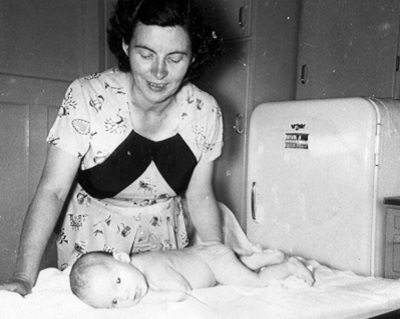|

From the Editor's Desk
Remembering What's Important
By Wendy Priesnitz
My mother died last December after having a major stroke. She was approaching 100 and suffering from vascular dementia. For the past few years, I’ve read and thought a lot about what happens when one’s mind fails, trying to understand my mother’s escalating confusion and the paranoia and other hostile behaviors that accompanied it. That search didn’t end with my mother’s death, but its focus has switched to what I can learn about myself from having observed her dementia, and to how I can prevent, or at least stall, dementia’s claim on my own brain in 30 or so years. I know and follow all the regular suggestions: Take antioxidants, keep the brain active, stay healthy and fit, maintain a social network. But my search has taken me deeper.
For instance, there is the University of Pennsylvania study where memory loss was reversed through daily yogic meditation that dramatically increased blood flow to the area of the brain associated with learning and memory. And there’s also evidence that the practice of meditation might allay the fear with which we view dementia, allowing us to be kinder and more trusting – and less angry or paranoid – if it does knock on our door. I’ve been thinking that our personal histories, as well as our attitudes about life in the present, probably influence the way we face such issues of aging. As David Albert writes in his “What Really Matters” column in this issue, memory is our ability to bring forward some elements of past experiences into the present...and how our memory composes the past determines our future.
There are some psychologists who suggest that, rather than viewing dementia as a debilitating illness, we could perceive it as an altered state of consciousness from which there is much to learn. (This is not to diminish the pain and hardship both caregivers and those afflicted with dementia can suffer.) Nader Robert Shabahangi, founder of the Pacific Institute, which teaches non-pathologizing, non-judgmental techniques of caregiving, has pursued this idea. In a 2005 paper entitled Redefining Dementia: Between the World of Forgetting and Remembering, he wrote:
“What is called dementia can be understood as an invitation to remember something we may have forgotten in our hurried lives. Those ‘suffering’ from dementia – through their very forgetting – can remind us of the rich and complex essence of our humanity, an essence at least as much about being as about doing, as much about wonder as about knowing, as much about forgetting as about remembering.”
When a small child wanders in the moment, pausing to explore and discover objects lying in their path and forgetting their destination, we believe that their experience was enriched. But we also believe that adults need to have a better sense of direction than that child has, to be more focused, more purposeful, more goal- and success-oriented. Our definition of success in our economy – as much as in our own lives – revolves around constant growth. And since we measure success as growth – gaining more money, more speed, more memory – we experience dementia as a negative because it impairs growth as we have defined it. As Shabahangi says, because we worship gain, dementia is a metaphor for loss. That’s why, when a person with dementia behaves like that small child, we find their unfocused wanderings to be socially unacceptable and maybe even a bit scary.
However, there is a valuable lesson that we can learn from people with dementia – one that we must learn if we are to pull ourselves out of our current ecological and economic crises: People like my mother can teach us to re-examine our obsession with growth-at-all-cost. (See my article about alternatives to GDP for some examples of people who are already doing that.) They can teach us the value of slow. They can demonstrate the importance of things that don’t necessarily seem to fit into our hectic pursuit and measurement of goals. They can remind us that the journey matters as much as – if not more than – the final destination.
Wendy Priesnitz is the co-founder and editor of Natural Life Magazine, where an earlier version of this appeared as an editorial in 2009. She is also the author of 13 books and a contributor to many more.
|

